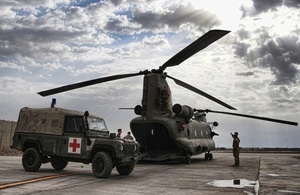New research shows need for emergency responders to carry blood
Dstl research shows that using blood products to treat severely injured patients before they reach hospital improves chances of survival.

Medical evacuation response team helicopter in Afghanistan
New research carried out by Ministry of Defence (MOD) scientists at the Defence Science and Technology Laboratory (Dstl), with the Royal Centre for Defence Medicine (RCDM), has demonstrated the need for emergency first responders to carry blood products. The research has provided the first evidence that the use of blood products (red blood cells and plasma) to treat severely injured patients before they reach hospital significantly improves their chances of survival.
In 2008 the medical evacuation response team (MERT) in Afghanistan started carrying blood products to injured personnel on the frontline thanks to the development of special refrigeration units on the Chinook helicopters. This emergency care procedure, coupled with other measures, has been credited with saving a number of lives in Afghanistan.
Dr Malcolm Russell MBE is the Medical Director of the Kent, Surrey & Sussex Air Ambulance Trust; he is also an ex-military doctor, and former Senior Lecturer in Military Pre-hospital Emergency Medicine. Dr Russell says:
Clinical experience from military operations over the last 10-15 years has suggested that administering blood products to patients who have suffered substantial blood loss due to major trauma ought to be helpful in reducing shock and improving survival. Two years ago, Kent, Surrey & Sussex Air Ambulance took the decision to carry packed red blood cells on our helicopters in our quest to improve the outcome for our civilian major trauma patients. Earlier this year, we were the first UK air ambulance to carry freeze-dried plasma as well as packed red blood cells and we carefully balance the use of these products as we resuscitate our major trauma patients.
The latest Dstl and RCDM research proves the benefits of administering blood products to severely injured patients before they reach hospital and provides much-needed evidence for the continued use of this procedure. It could also have an impact for civilian first responders such as ambulance and air ambulance crew. Currently only a few air ambulance services in the UK have the mandate, staff and systems required to carry blood products.
Dr Russell continues:
We feel that the administration of blood products has been really helpful for major trauma patients, though proving that is very difficult in practice. Consequently, we were lacking the objective evidence that is essential to consolidate the clinical practice and bring it into wider use. We therefore welcome this excellent piece of research which now provides exactly that evidence we’ve been looking for and which supports our clinical intuition, judgement and subjective evaluation of clinical evidence. This combined evidence now makes the case that giving blood products to this patient group gives real benefit to them and is therefore a practice that should be continued and developed further.
Dr Emrys Kirkman, Principal Scientist at Dstl says:
Badly injured people often lose the ability to form a blood clot properly, just when they need it most. Our research provides the scientific foundation for the premise that giving blood products before seriously injured patients reach hospital could help save lives as it improves the ability to form blood clots. While this represents emerging practice based on clinical common sense nobody knew whether it actually helped, this is the first study to prove the benefits. We hope that this research will encourage decision makers to think again about the possibilities for both military and civilian first responders to carry blood products.
Read the full research paper which was published in the journal SHOCK.
Dstl media enquiries
Email DstlPress@dstl.gov.uk
Press office 01980 950000 option 2